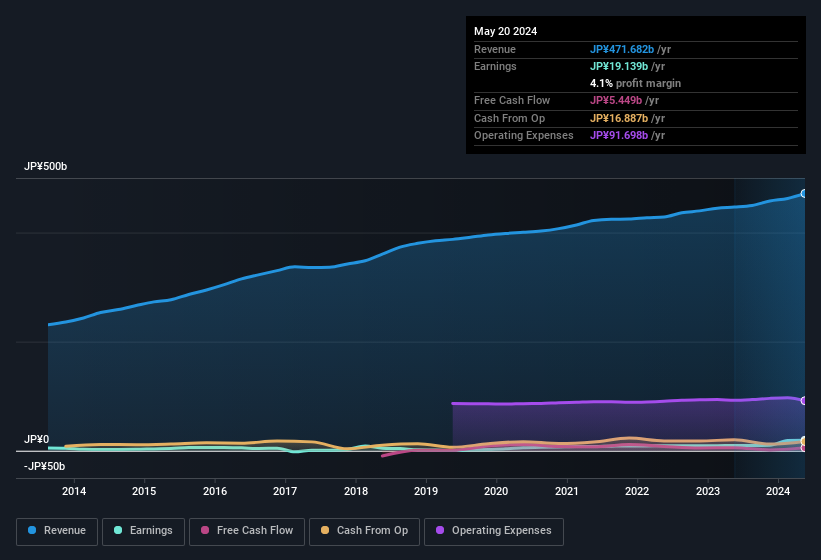Statutory Earnings May Not Be The Best Way To Understand ASKUL's (TSE:2678) True Position

We didn't see ASKUL Corporation's (TSE:2678) stock surge when it reported robust earnings recently. We think that investors might be worried about the foundations the earnings are built on.
Check out our latest analysis for ASKUL

A Closer Look At ASKUL's Earnings
As finance nerds would already know, the accrual ratio from cashflow is a key measure for assessing how well a company's free cash flow (FCF) matches its profit. The accrual ratio subtracts the FCF from the profit for a given period, and divides the result by the average operating assets of the company over that time. This ratio tells us how much of a company's profit is not backed by free cashflow.
Therefore, it's actually considered a good thing when a company has a negative accrual ratio, but a bad thing if its accrual ratio is positive. While it's not a problem to have a positive accrual ratio, indicating a certain level of non-cash profits, a high accrual ratio is arguably a bad thing, because it indicates paper profits are not matched by cash flow. To quote a 2014 paper by Lewellen and Resutek, "firms with higher accruals tend to be less profitable in the future".
For the year to May 2024, ASKUL had an accrual ratio of 0.47. Ergo, its free cash flow is significantly weaker than its profit. Statistically speaking, that's a real negative for future earnings. In fact, it had free cash flow of JP¥5.4b in the last year, which was a lot less than its statutory profit of JP¥19.1b. ASKUL's free cash flow actually declined over the last year, but it may bounce back next year, since free cash flow is often more volatile than accounting profits. However, that's not all there is to consider. The accrual ratio is reflecting the impact of unusual items on statutory profit, at least in part.
That might leave you wondering what analysts are forecasting in terms of future profitability. Luckily, you can click here to see an interactive graph depicting future profitability, based on their estimates.
How Do Unusual Items Influence Profit?
The fact that the company had unusual items boosting profit by JP¥12b, in the last year, probably goes some way to explain why its accrual ratio was so weak. While we like to see profit increases, we tend to be a little more cautious when unusual items have made a big contribution. When we crunched the numbers on thousands of publicly listed companies, we found that a boost from unusual items in a given year is often not repeated the next year. Which is hardly surprising, given the name. We can see that ASKUL's positive unusual items were quite significant relative to its profit in the year to May 2024. All else being equal, this would likely have the effect of making the statutory profit a poor guide to underlying earnings power.
Our Take On ASKUL's Profit Performance
ASKUL had a weak accrual ratio, but its profit did receive a boost from unusual items. On reflection, the above-mentioned factors give us the strong impression that ASKUL'sunderlying earnings power is not as good as it might seem, based on the statutory profit numbers. If you want to do dive deeper into ASKUL, you'd also look into what risks it is currently facing. You'd be interested to know, that we found 2 warning signs for ASKUL and you'll want to know about them.
Our examination of ASKUL has focussed on certain factors that can make its earnings look better than they are. And, on that basis, we are somewhat skeptical. But there are plenty of other ways to inform your opinion of a company. For example, many people consider a high return on equity as an indication of favorable business economics, while others like to 'follow the money' and search out stocks that insiders are buying. While it might take a little research on your behalf, you may find this free collection of companies boasting high return on equity, or this list of stocks with significant insider holdings to be useful.
New: Manage All Your Stock Portfolios in One Place
We've created the ultimate portfolio companion for stock investors, and it's free.
• Connect an unlimited number of Portfolios and see your total in one currency
• Be alerted to new Warning Signs or Risks via email or mobile
• Track the Fair Value of your stocks
Have feedback on this article? Concerned about the content? Get in touch with us directly. Alternatively, email editorial-team (at) simplywallst.com.
This article by Simply Wall St is general in nature. We provide commentary based on historical data and analyst forecasts only using an unbiased methodology and our articles are not intended to be financial advice. It does not constitute a recommendation to buy or sell any stock, and does not take account of your objectives, or your financial situation. We aim to bring you long-term focused analysis driven by fundamental data. Note that our analysis may not factor in the latest price-sensitive company announcements or qualitative material. Simply Wall St has no position in any stocks mentioned.
Have feedback on this article? Concerned about the content? Get in touch with us directly. Alternatively, email editorial-team@simplywallst.com
About TSE:2678
ASKUL
Provides office supplies mail-order services for small and medium sized offices in Japan.
Flawless balance sheet average dividend payer.
Market Insights
Community Narratives




